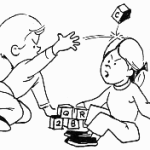This is a sequel to our “Choosing the Perfect Pre-School for your Child” series. If you haven’t already read Part 1, you can do so by clicking here.
During Your Visit
Once you have short-listed prospective pre-schools, schedule a time to visit each school. You can arrange an initial visit without your child and a follow-up visit with him/her to observe how he/he takes to the setting.
Remember, the key is to understand what you want your child to gain in these crucial years of learning and getting prepared to ask the right questions based on the following:
Accreditation
 Ask if the school is accredited, to which board, and whether it has clear and consistent regulations. Accreditation standards can vary, and some pre-schools may meet standards without being accredited by educational organizations. Ask the school how it addresses this issue.
Ask if the school is accredited, to which board, and whether it has clear and consistent regulations. Accreditation standards can vary, and some pre-schools may meet standards without being accredited by educational organizations. Ask the school how it addresses this issue.
Philosophy
 It is very important to find out the school’s educational philosophy to assess its how it teaches and cares for its students. Some philosophies are play-based, some traditional and some hybrid with multiple philosophies and models. It’s a must for any pre-school to have a model that is relatively well known and that you’re comfortable with long term effects and its general principles of learning.
It is very important to find out the school’s educational philosophy to assess its how it teaches and cares for its students. Some philosophies are play-based, some traditional and some hybrid with multiple philosophies and models. It’s a must for any pre-school to have a model that is relatively well known and that you’re comfortable with long term effects and its general principles of learning.
Student-Teacher Ratio
The fewer children, the better for your child since he/she will receive more individual attention. But too much attention can foster dependence. A healthy student-teacher ratio is one that can breed independence with attention. The ratio of 1:30 can is highly effective and can meet every child’s needs.
Discipline
 Ask how the school deals with behavior such as hitting or biting. Ask how they deal with conflict – do they believe children should work things out themselves? Do they believe in “time outs”? What happens during a time out? Does the child sit alone or with a teacher? Are children punished? If so how? It’s important that you agree with the school’s discipline policy and trust your child with their judgement.
Ask how the school deals with behavior such as hitting or biting. Ask how they deal with conflict – do they believe children should work things out themselves? Do they believe in “time outs”? What happens during a time out? Does the child sit alone or with a teacher? Are children punished? If so how? It’s important that you agree with the school’s discipline policy and trust your child with their judgement.
You can learn a lot about a pre-school by the way the staff greets, approaches and conducts the visit with you and your child. A good preschool program should make all children feel successful by inculcating necessary life skills and the interest to learn reading, writing, conversing, math and general knowledge.
During the visit spend time questioning yourself and the staff on the following areas:
Look and feel of the school
Does it feel warm and inviting? Is it clean and organized, or messy and noisy? What kind of work is displayed? Do you see kids’ artwork, or charts and worksheets? Are the facilities like play area and restrooms well maintained?
Classroom Atmosphere
Do students look happy? Do they look enthusiastic, busy or bored? Are they having animated interactions with each other, the staff, and the teachers? Are they learning and doing an activity independently or together? Are some children getting individual attention? Do children decide their activities or are they being directed?
Class Schedule and Curriculum
How is the day structured? Is the day broken up into many different classes for each subject? What are the main subjects being taught? How much time do they get to play?
Teachers and Support Staff
How do they address and assist the students cheerfully? Are they patient and caring? How do they handle children with temper tantrums or illnesses?
Specific Needs
Ask questions on toilet-training, children’s nutrition and napping habits based on your child’s needs and areas that require attention.
Extra-curricular Activities
Children need plenty of activities to engage themselves and to explore their interests. What kind activities like drama, activities, sport etc. are allowed and encouraged?
Parent Participation
How can parents get involved in the school? Is there an active parent’s organization? Are there opportunities for parents volunteer in the classroom?
Communication Process
How do teachers and the administration keep parents informed? Is there a good newsletter? Do you get e-mail updates? Can you e-mail the teachers with your concerns? How often can you meet with your child’s teacher?
Parent Testimonials
Find out if you could talk to existing and former parents about the school. If they have written or video testimonials they are willing to share, spend some time reading and viewing them.
Your Instinct
A preschool may have the best of everything you’ve been dreaming about and still be affordable. But if something doesn’t feel right then seek some clarity by re-evaluating the above mentioned parameters.
It’s also absolutely essential that you develop a healthy partnership with the school and feel comfortable and trust the school’s head, who is responsible for the day to day affairs of the school. As a parent, it goes without saying that both you and your child should feel secure and pleased with the teachers, who will address your main concerns and by spending many hours with your child, will positively influence your child’s future learning years.
After Your Visit
If your child accompanies you to visit the school notice how he/she responds to the school environment, the children and the teachers and vice-versa. It’s also better to ask the child after the visit and not during the visit whether he/she likes the pre-school. This will give you a hint or a slight indication as to whether the preschool is a good fit for your family or not.
Nobody knows the child better the parent and the best way to judge and pick the perfect pre-school is by picturing how your child will be taken care of in the environment keeping his/her nature, personality, interests and comfort above your own.
If you have taken into account all the above mentioned factors, you will successfully be able to take an informed decision that will guarantee your child’s happiness, growth and development.
Do let us know if these posts were helpful in any way and don’t shy away from sharing your insight and personal experiences while selecting the perfect pre-school for your little one. 🙂
